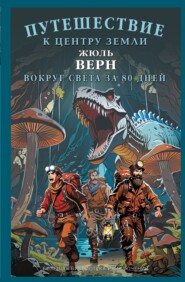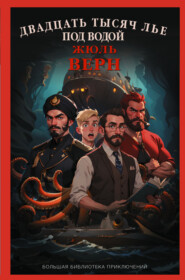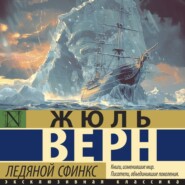По всем вопросам обращайтесь на: info@litportal.ru
(©) 2003-2024.
✖
From the Earth to the Moon, Direct in Ninety-Seven Hours and Twenty Minutes: and a Trip Round It
Настройки чтения
Размер шрифта
Высота строк
Поля
But that it might act with regularity, the apparatus must be kept in perfect order; so each morning Michel visited the escape regulators, tried the taps, and regulated the heat of the gas by the pyrometer. Everything had gone well up to that time, and the travellers, imitating the worthy Joseph T. Maston, began to acquire a degree of embonpoint, which would have rendered them unrecognizable if their imprisonment had been prolonged to some months. In a word, they behaved like chickens in a coop; they were getting fat.
In looking through the scuttle Barbicane saw the spectre of the dog, and other divers objects which had been thrown from the projectile obstinately following them. Diana howled lugubriously on seeing the remains of Satellite, which seemed as motionless as if they reposed on the solid earth.
"Do you know, my friends," said Michel Ardan, "that if one of us had succumbed to the shock consequent on departure, we should have had a great deal of trouble to bury him? What am I saying? to etherize him, as here ether takes the place of earth. You see the accusing body would have followed us into space like a remorse."
"That would have been sad," said Nicholl.
"Ah!" continued Michel, "what I regret is not being able to take a walk outside. What voluptuousness to float amid this radiant ether, to bathe oneself in it, to wrap oneself in the sun's pure rays. If Barbicane had only thought of furnishing us with a diving apparatus and an air-pump, I could have ventured out and assumed fanciful attitudes of feigned monsters on the top of the projectile."
"Well, old Michel," replied Barbicane, "you would not have made a feigned monster long, for in spite of your diver's dress, swollen by the expansion of air within you, you would have burst like a shell, or rather like a balloon which has risen too high. So do not regret it, and do not forget this – as long as we float in space, all sentimental walks beyond the projectile are forbidden."
Michel Ardan allowed himself to be convinced to a certain extent. He admitted that the thing was difficult but not impossible, a word which he never uttered.
The conversation passed from this subject to another, not failing for an instant. It seemed to the three friends as though, under present conditions, ideas shot up in their brains as leaves shoot at the first warmth of spring. They felt bewildered. In the middle of the questions and answers which crossed each other, Nicholl put one question which did not find an immediate solution.
"Ah, indeed!" said he; "it is all very well to go to the moon, but how to get back again?"
His two interlocutors looked surprised. One would have thought that this possibility now occurred to them for the first time.
"What do you mean by that, Nicholl?" asked Barbicane gravely.
"To ask for means to leave a country," added Michel, "when we have not yet arrived there, seems to me rather inopportune."
"I do not say that, wishing to draw back," replied Nicholl; "but I repeat my question, and I ask, 'How shall we return?'"
"I know nothing about it," answered Barbicane.
"And I," said Michel, "if I had known how to return, I would never have started."
"There's an answer!" cried Nicholl.
"I quite approve of Michel's words," said Barbicane; "and add, that the question has no real interest. Later, when we think it advisable to return, we will take counsel together. If the Columbiad is not there, the projectile will be."
"That is a step certainly. A ball without a gun!"
"The gun," replied Barbicane, "can be manufactured. The powder can be made. Neither metals, saltpetre, nor coal can fail in the depths of the moon, and we need only go 8000 leagues in order to fall upon the terrestrial globe by virtue of the mere laws of weight."
"Enough," said Michel with animation. "Let it be no longer a question of returning: we have already entertained it too long. As to communicating with our former earthly colleagues, that will not be difficult."
"And how?"
"By means of meteors launched by lunar volcanos."
"Well thought of, Michel," said Barbicane in a convinced tone of voice. "Laplace has calculated that a force five times greater than that of our gun would suffice to send a meteor from the moon to the earth, and there is not one volcano which has not a greater power of propulsion than that."
"Hurrah!" exclaimed Michel; "these meteors are handy postmen, and cost nothing. And how we shall be able to laugh at the post-office administration. But now I think of it – "
"What do you think of?"
"A capital idea. Why did we not fasten a thread to our projectile, and we could have exchanged telegrams with the earth?"
"The deuce!" answered Nicholl. "Do you consider the weight of a thread 250,000 miles long nothing?"
"As nothing. They could have trebled the Columbiad's charge; they could have quadrupled or quintupled it!" exclaimed Michel, with whom the verb took a higher intonation each time.
"There is but one little objection to make to your proposition," replied Barbicane, "which is that, during the rotary motion of the globe, our thread would have wound itself round it like a chain on a capstan, and that it would inevitably have brought us to the ground."
"By the thirty-nine stars of the Union!" said Michel, "I have nothing but impracticable ideas to-day; ideas worthy of J. T. Maston. But I have a notion that, if we do not return to earth, J. T. Maston will be able to come to us."
"Yes, he'll come," replied Barbicane; "he is a worthy and a courageous comrade. Besides, what is easier? Is not the Columbiad still buried in the soil of Florida? Is cotton and nitric acid wanted wherewith to manufacture the pyroxile? Will not the moon again pass to the zenith of Florida? In eighteen years' time will she not occupy exactly the same place as to-day?"
"Yes," continued Michel, "yes, Marston will come, and with him our friends Elphinstone, Blomsberry, all the members of the Gun Club, and they will be well received. And by and by they will run trains of projectiles between the earth and the moon! Hurrah for J. T. Maston!"
It is probable that, if the Hon. J. T. Maston did not hear the hurrahs uttered in his honour, his ears at least tingled. What was he doing then? Doubtless posted in the Rocky Mountains, at the station of Long's Peak, he was trying to find the invisible projectile gravitating in space. If he was thinking of his dear companions, we must allow that they were not far behind him; and that, under the influence of a strange excitement, they were devoting to him their best thoughts.
But whence this excitement, which was evidently growing upon the tenants of the projectile? Their sobriety could not be doubted. This strange irritation of the brain, must it be attributed to the peculiar circumstances under which they found themselves, to their proximity to the orb of night, from which only a few hours separated them, to some secret influence of the moon acting upon their nervous system? Their faces were as rosy as if they had been exposed to the roaring flames of an oven; their voices resounded in loud accents; their words escaped like a champagne cork driven out by carbonic acid; their gestures became annoying, they wanted so much room to perform them; and, strange to say, they none of them noticed this great tension of the mind.
"Now," said Nicholl, in a short tone, "now that I do not know whether we shall ever return from the moon, I want to know what we are going to do there?"
"What we are going to do there?" replied Barbicane, stamping with his foot as if he was in a fencing saloon; "I do not know."
"You do not know!" exclaimed Michel, with a bellow which provoked a sonorous echo in the projectile.
"No, I have not even thought about it," retorted Barbicane, in the same loud tone.
"Well, I know," replied Michel.
"Speak, then," cried Nicholl, who could no longer contain the growling of his voice.
"I shall speak if it suits me," exclaimed Michel, seizing his companions' arms with violence.
"It must suit you," said Barbicane, with an eye on fire and a threatening hand. "It was you who drew us into this frightful journey, and we want to know what for."
"Yes," said the captain, "now that I do not know where I am going, I want to know why I am going."
"Why?" exclaimed Michel, jumping a yard high, "why? To take possession of the moon in the name of the United States; to add a fortieth State to the Union; to colonize the lunar regions; to cultivate them, to people them, to transport thither all the prodigies of art, of science, and industry; to civilize the Selenites, unless they are more civilized than we are; and to constitute them a republic, if they are not already one!"
"And if there are no Selenites?" retorted Nicholl, who, under the influence of this unaccountable intoxication, was very contradictory.
"Who said that there were no Selenites?" exclaimed Michel in a threatening tone.
"I do," howled Nicholl.
"Captain," said Michel, "do not repeat that insolence, or I will knock your teeth down your throat!"
The two adversaries were going to fall upon each other, and the incoherent discussion threatened to merge into a fight, when Barbicane intervened with one bound.
"Stop, miserable men," said he, separating his two companions; "if there are no Selenites, we will do without them."

















